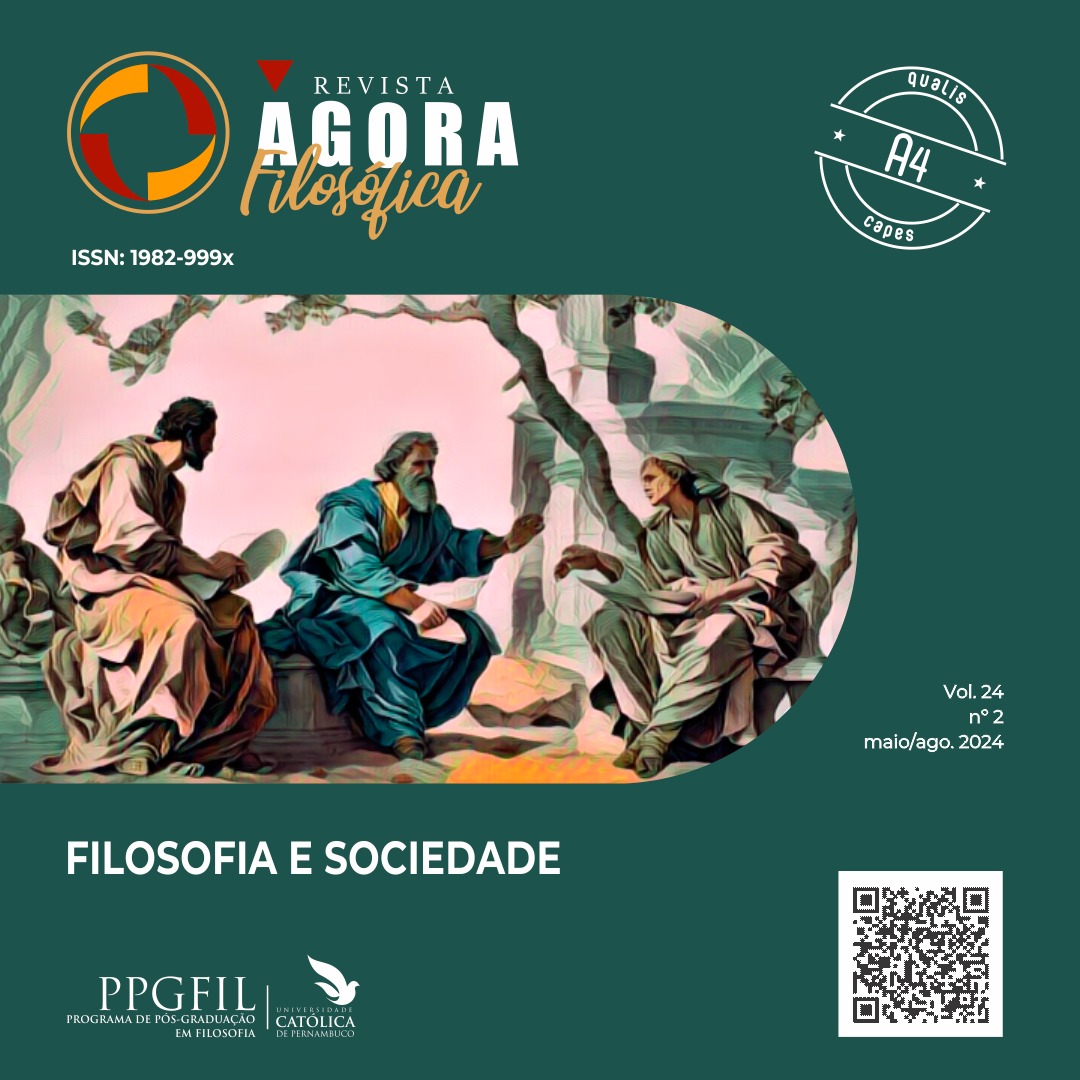Some notes on the relationship between Adorno and the Southern Epistemology
DOI:
https://doi.org/10.25247/P1982-999X.2024.v24n2.p225-248Palabras clave:
Southern Epistemology, Adorno, Colonialism, Culture Industry, ModernityResumen
This paper aims to develop an understanding of how the culture industry still operates in the postcolonial era. To this end, the first part of this paper will look at Adorno and Horkheimer’s reading of modernity, touching on how instrumental reasoning can lend itself to barbarism, along with an exposition of Adorno’s analysis of the culture industry. The second part will present decolonial theory, its critique of European modernity and, particularly, its focus on neo-imperialism. This theory will then be put alongside critical theory, analyzing their differences concerning racial issues and how their critique of capitalism may represent a meeting point between the two theories. Finally, the conclusion will consider all previous elements to explain the connection between the Culture industry and its current strategy in former colonial areas.
Descargas
Referencias
ADORNO, T. Progresso. Tradução: G. Cohn. Lua Nova: Revista de Cultura e Política, v. 27, p. 217–236, 1992.
ADORNO, T. Minima moralia. New York: Verso, 2005.
ADORNO, T. Why still philosophy? Critical models: interventions and Catchwords. Columbia: University Press, Sep 14, 2005b.
ADORNO, T. History and freedom: lectures 1964-1965. Trans. R. Tiedemann. New York: Polity Press, 2006.
ADORNO, T. Dialética negativa. Rio de Janeiro: Jorge Zahar, 2009.
ADORNO, T.; Horkheimer, M. Dialectic of enlightenment: philosophical fragments.1. ed. Trans. Gunzelin Schmid Noerr. Redwood City: Stanford University Press, 2002.
AGUIAR, J. Por um marxismo decolonial: contribuições para a reflexão sociológica contemporânea. Revista Observatorio Latinoamericano y Caribeño, n. 2, 2018.
ALLEN, A. The end of progress: decolonizing the normative foundations of critical theory. Columbia University Press, 2015.
ASPRELLA, E.; SCHULZ, J. Colonialidad del saber, epistemologías del sur y pensamiento decolonial: crisis y oportunidades en la configuración de un nuevo orden mundial. Cuadernos de la Facultad de Humanidades y Ciencias Sociales. Universidad Nacional de Jujuy, n. 57, p. 177-196, 2020.
BAUM, B. Decolonizing critical theory. Constellations, v. 22, n. 3, p. 420–434, 2015. https://doi.org/10.1111/1467-8675.12169
BELLESTRIN, L. Imperialismo como Imperialidade: o elo perdido do giro decolonial. In: 38º Encontro Anual da ANPOCS, Caxambu, 2014. Disponível em: www.anpocs.com/index.php/papers-38-encontro/gt-1/gt26-1/9346-imperialismo-como-imperialidade-o-elo-perdido-do-giro-decolonial/Mle.
BERNARDINO-COSTA, J.; GROSFOGUEL, R. Decolonialidade e perspectiva negra. Sociedade e Estado, São Paulo, v. 31, n. 1, p. 15-24, 2016.
BIDASECA, K.; MENESES, M. P. Introdução: as Epistemologias Do Sul Como Expressão De Lutas Epistemológicas E Ontológicas. In: BIDASECA, K.; MENESES, M. P. (org.). Epistemologías del Sur. Buenos Aires: CLACSO, 2018.
BUCK-MORSS, S. Thinking past terror: Islamism and critical theory on the left. Verso, 2016.
DEMIROVIĆ, Alex. What Does It Mean to Speak of the Actuality of Critical Theory?. ACME: An International E-Journal for Critical Geographies, v. 12, n. 2, p. 366-379, 2013.
FANON, F. The wretched of the earth. Trans. R. Philcox. New York: Grove Press, 2005.
FRASER, N. Expropriation and exploitation in racialized capitalism: a reply to michael dawson. Critical Historical Studies, v. 3, n. 1, p. 163–178, 2016. https://doi.org/10.1086/685814
GROSFOGUEL, R. Para descolonizar os estudos de economia política e os estudos pós-coloniais: transmodernidade, pensamento de fronteira e colonialidade global. Revista Crítica de Ciências Sociais, n. 80, p. 115–147, 2008.
HABERMAS, Jürgen. “Bemerkungen zu Beginn einer Vorlesung”. In: HABERMAS, Jürgen. Die Neue Unübersichtlichkeit. Frankfurt am Main, 1983.
HORKHEIMER, M. Critical theory: selected essays. Continuum, 1995.
INGRAM, James. Teoria crítica e pós-colonialismo. Tradução: Mariana Fidelis e Simone Fernandes. Dissonância: Revista de Teoria Crítica, Campinas, v. 4, p. 399–435, 2020.
JARMIN, G. Dialética negativa e o pensamento decolonial. Revista Sures, n. 10, p. 1-14, 2017.
KANE, Cheikh Hamidou. L’aventure ambiguë. Paris: Julliard, 1971.
MCARTHUR, Jan. Critical theory in a decolonial age. Educational philosophy and theory, 2021.
MIGNOLO, Walter D. Coloniality of power and de-colonial thinking. Cultural Studies, v. 21, n. 2–3, p. 155–167, 2007a.
MIGNOLO, Walter D. Habitar la frontera: sentir y pensar la descolonialidad (Antología 1999–2014). Barcelona: CIDOB, 2015.
MIGNOLO, Walter D.; WALSH, Catherine E. Ondecoloniality: concepts, analytics, praxis. Duke University Press, 2018.
NARAYAN, Y. On Biocoloniality and ‘Respectability’ in Contemporary London. Cultural Studies, v. 29, n. 2, p. 185–204, 2015.
PORTELLA, Elizabeth. Adorno’s “Natural History” and Anti-Colonial Critique: Critical Theory and Afro-Caribbean Marxism. Dissonância: Revista de Teoria Crítica, v. 4, Campinas, 2020, p. 162–202.
QUIJANO, Aníbal. Colonialidad y modernidad-racionalidad. In: BONILLA, H. (org.). Los conquistados: 1492 y la población indígena de las Américas. Bogotá: Tercer Mundo, 1992. p. 437–449.
QUIJANO, Aníbal. Colonialidad del poder, cultura y conocimiento en América Latina. Dispositio, Quito, v. 24, n. 51, p. 137-148, 1999.
QUIJANO, Aníbal. Colonialidade do poder, eurocentrismo e América Latina. In: LANDER, E. (org.). A colonialidade do saber: eurocentrismo e ciências sociais, perspectivas latino-americanas. Buenos Aires: CLACSO, 2005.
RODNEY, W. How. Europe snderdeveloped Africa. New York: Verso, 1981.
SAID, Edward W. Orientalismo: o Oriente como invenção do Ocidente. São Paulo: Companhia das Letras, 1990.
SANTOS, B. de Sousa. Epistemologies of the South. Justice against Epistemicide. Abingdon: Routledge, 2014.
SANTOS, B. de Sousa. O fim do império cognitivo: a Afirmação das Epistemologias do sul. São Paulo: Autêntica, 2019.
SEGATO, Rita Laura. Raça é signo. Brasília: Série Antropologia 372, 2005.
SPIVAK, G. C. Subaltern studies: deconstructing historiography. In: GUHA, R.; SPIVAK, G. C. (Ed.). Selected Studies. New York: Oxford University Press, p. 3-32.
WALLERSTEIN, Immanuel. World-systems analysis. London: Durham, 2004.
WEBER, Max. The protestant ethic and the spirit of capitalism. Trans. Talcott Parsons. London, 1930.
WEHELIYE, A. G. Habeas viscus: racializing assemblages, biopolitics, and black feminist theories of the human. Duke University Press, 2014.
WHYMAN, T. Understanding Adorno on ‘Natural-History’. International Journal of Philosophical Studies, v. 24, n. 4, p. 452–472, 2016.
WIREDU, K. Conceptual decolonization as an imperative in contemporary African philosophy: some personal reflections. Rue Descartes, n. 36, p. 53-64, 2002.
WOOD, E. O império do capital. Tradução: P. Castanheira. São Paulo: Boitempo, 2014.
Descargas
Publicado
Número
Sección
Licencia
Derechos de autor 2024 Gustavo Ruiz da Silva, Daniel Lopes Prado Matheus

Esta obra está bajo una licencia internacional Creative Commons Atribución 4.0.
Usted es libre de:
- Compartir — copiar y redistribuir el material en cualquier medio o formato para cualquier propósito, incluso comercialmente.
- Adaptar — remezclar, transformar y construir a partir del material para cualquier propósito, incluso comercialmente.
- La licenciante no puede revocar estas libertades en tanto usted siga los términos de la licencia
Bajo los siguientes términos:
- Atribución — Usted debe dar crédito de manera adecuada , brindar un enlace a la licencia, e indicar si se han realizado cambios . Puede hacerlo en cualquier forma razonable, pero no de forma tal que sugiera que usted o su uso tienen el apoyo de la licenciante.
- No hay restricciones adicionales — No puede aplicar términos legales ni medidas tecnológicas que restrinjan legalmente a otras a hacer cualquier uso permitido por la licencia.
Avisos:
No tiene que cumplir con la licencia para elementos del materiale en el dominio público o cuando su uso esté permitido por una excepción o limitación aplicable.
No se dan garantías. La licencia podría no darle todos los permisos que necesita para el uso que tenga previsto. Por ejemplo, otros derechos como publicidad, privacidad, o derechos morales pueden limitar la forma en que utilice el material.
















